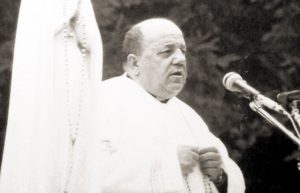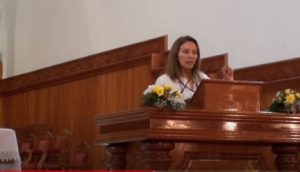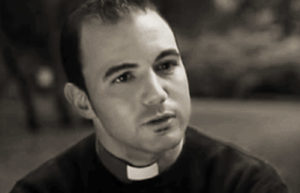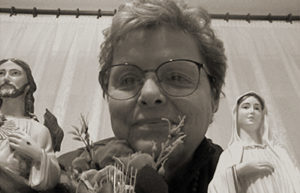Have you ever wondered what good it is to pray and “live in the Divine Will”?[1]cf. How to Live in the Divine Will How does it affect others, if at all?
Servant of God Luisa Piccarreta wondered this herself. She faithfully prayed “in the Divine Will”, offering to God her “I love You”, “Thank You” and “I bless You” upon all created things. Jesus affirmed that “all the acts done in my Will diffuse over all, and all take part in them” [2]November 22, 1925, Volume 18 in this way:
See, when, at daybreak, you were saying: ‘May my mind rise in the Supreme Will, in order to cover all the intelligences of creatures with your Will, so that all may rise in It; and in the name of all I give You the adoration, the love, the submission of all created intelligences…’ – while you were saying this, a celestial dew poured upon all creatures, covering them, to bring the requital of your act to all. Oh! how beautiful it was to see all creatures covered by this celestial dew which my Will formed, symbolized by the night dew which can be found in the morning over all plants, to embellish them, to fecundate them, and to prevent those which are about to wither from drying up. With its celestial touch, it seems to place a touch of life in order to make them vegetate. How enchanting is the dew at daybreak. But much more enchanting and beautiful is the dew of the acts which the soul forms in my Will. —November 22, 1925, Volume 18
But Luisa replied:
Yet, My Love and my Life, with all this dew, creatures do not change.
And Jesus:
If the night dew does so much good to the plants, unless it falls on dry wood, severed from the plants, or upon things which contain no life, such that, even though they remain covered with dew and somehow embellished, the dew is as though dead for them, and as the sun rises, little by little It withdraws it from them – much more good does the dew which my Will makes descend upon souls, unless they are completely dead to grace. And yet, by the vivifying virtue It possesses, even if they are dead, It tries to infuse in them a breath of life. But all others, some more, some less, according to their dispositions, feel the effects of this beneficial dew.
Who can fathom the myriad ways that our prayer in the Divine Will may dispose a heart to grace through a memory, a glance, the warmth of the sun, the smile of a stranger, the chuckle of baby… to even a subtle opening of another’s heart to the transcendent truth of the present moment, where Jesus is waiting, clamoring to embrace the soul?[3]“The flames of mercy are burning Me—clamoring to be spent; I want to keep pouring them out upon souls; souls just don’t want to believe in My goodness.” (Jesus to St. Faustina, Divine Mercy in My Soul, Diary, n. 177)
And so, dear brothers and sisters (especially you who are just getting your feet wet with the dew of “living in the Divine Will”), don’t be discouraged when you are praying these acts of love and adoration in return for God’s love expressed in the fiats of Creation, Redemption, and Sanctification. It’s not about what we feel but we do in faith, trusting in His Word. Jesus assures both Luisa and us that what we do in the Divine Will is not wasted but has cosmic ramifications.
In today’s Psalm, it says:
Every day will I bless you, and I will praise your name forever and ever. Great is the Lord and highly to be praised; His greatness is unsearchable… Let all your works give you thanks, O LORD, and let your faithful ones bless you. (Psalm 145)
Of course, not all God’s works — that is we humans who are made “in His image” — give Him thanks and praise. However, the one who lives and prays “in the Divine Will” offers to the Holy Trinity the adoration, blessing, and love They are due on behalf of all, for all. In return, all of creation receives the dew of grace —whether disposed to it or not — and creation inches ever closer toward the perfection for which it is groaning.
To human beings, God even gives the power of freely sharing in His providence by entrusting them with the responsibility of “subduing” the earth and having dominion over it. God thus enables men to be intelligent and free causes in order to complete the work of creation, to perfect its harmony for their own good and that of their neighbors. —Catechism of the Catholic Church, 307; cf. Creation Reborn
Do not be discouraged, then, if you do not fully grasp the science of the Divine Will.[4]Jesus describes His teachings as “the Science of sciences, which is my Will, a science all of Heaven”, November 12, 1925, Volume 18 Do not let your Morning (Prevenient) Prayer become rote; do not think that you — small and insignificant in the eyes of the world — are having no impact. Bookmark this page; re-read the words of Jesus; and persevere in this Gift until it becomes a real act of love, blessing, and adoration; until you delight in seeing everything as your own possession[5]Jesus: “…one must look at all things as one’s own, and have all the care for them.” (November 22, 1925, Volume 18) to give it back to God with praise and thanksgiving.[6]“Through Him, then, let us continually offer God a sacrifice of praise, that is, the fruit of lips that confess His name.” (Hebrews 13:15) For He assures you… you are impacting all of creation.
—Mark Mallett is a former journalist with CTV Edmonton, the author of The Final Confrontation and The Now Word, and a co-founder of Countdown to the Kingdom
Related Reading
Footnotes
| ↑1 | cf. How to Live in the Divine Will |
|---|---|
| ↑2 | November 22, 1925, Volume 18 |
| ↑3 | “The flames of mercy are burning Me—clamoring to be spent; I want to keep pouring them out upon souls; souls just don’t want to believe in My goodness.” (Jesus to St. Faustina, Divine Mercy in My Soul, Diary, n. 177) |
| ↑4 | Jesus describes His teachings as “the Science of sciences, which is my Will, a science all of Heaven”, November 12, 1925, Volume 18 |
| ↑5 | Jesus: “…one must look at all things as one’s own, and have all the care for them.” (November 22, 1925, Volume 18) |
| ↑6 | “Through Him, then, let us continually offer God a sacrifice of praise, that is, the fruit of lips that confess His name.” (Hebrews 13:15) |



 Why the Servant of God Luisa Piccarreta?
Why the Servant of God Luisa Piccarreta? of the saints. It wasn’t until she became a “Daughter of Mary” that the nightmares finally ceased at the age of eleven. In the following year, Jesus began to speak interiorly to her especially after receiving Holy Communion. When she was thirteen, He appeared to her in a vision that she witnessed from the balcony of her home. There, in the street below, she saw a crowd and armed soldiers leading three prisoners; she recognized Jesus as one of them. When He arrived beneath her balcony, He raised his head and cried out: “Soul, help Me!” Deeply moved, Luisa offered herself from that day on as a victim soul in expiation for the sins of mankind.
of the saints. It wasn’t until she became a “Daughter of Mary” that the nightmares finally ceased at the age of eleven. In the following year, Jesus began to speak interiorly to her especially after receiving Holy Communion. When she was thirteen, He appeared to her in a vision that she witnessed from the balcony of her home. There, in the street below, she saw a crowd and armed soldiers leading three prisoners; she recognized Jesus as one of them. When He arrived beneath her balcony, He raised his head and cried out: “Soul, help Me!” Deeply moved, Luisa offered herself from that day on as a victim soul in expiation for the sins of mankind. immobile, rigid-like state that appeared almost as if she were dead. It was only when a priest made the sign of the Cross over her body that Luisa regained her faculties. This remarkable mystical state persisted until her death in 1947—followed by a funeral that was no little affair. During that period in her life, she suffered no physical illness (until she succumbed to pneumonia at the end) and she never experienced bedsores, despite being confined to her little bed for sixty-four years.
immobile, rigid-like state that appeared almost as if she were dead. It was only when a priest made the sign of the Cross over her body that Luisa regained her faculties. This remarkable mystical state persisted until her death in 1947—followed by a funeral that was no little affair. During that period in her life, she suffered no physical illness (until she succumbed to pneumonia at the end) and she never experienced bedsores, despite being confined to her little bed for sixty-four years. Alicja Lenczewska
Alicja Lenczewska



 Elizabeth Kindelmann
Elizabeth Kindelmann Through what became The Spiritual Diary, Jesus and Mary taught Elizabeth, and they continue to instruct the faithful in the divine art of suffering for the salvation of souls. Tasks are assigned for each day of the week, which involve prayer, fasting, and night vigils, with beautiful promises attached to them, laced with special graces for priests and the souls in purgatory. In their messages, Jesus and Mary say that The Flame of Love of the Immaculate Heart of Mary is the greatest grace given to mankind since the Incarnation. And in the not-so-distant future, her flame will engulf the entire world.
Through what became The Spiritual Diary, Jesus and Mary taught Elizabeth, and they continue to instruct the faithful in the divine art of suffering for the salvation of souls. Tasks are assigned for each day of the week, which involve prayer, fasting, and night vigils, with beautiful promises attached to them, laced with special graces for priests and the souls in purgatory. In their messages, Jesus and Mary say that The Flame of Love of the Immaculate Heart of Mary is the greatest grace given to mankind since the Incarnation. And in the not-so-distant future, her flame will engulf the entire world. Father Stefano Gobbi
Father Stefano Gobbi Why Gisella Cardia?
Why Gisella Cardia? Thirdly, the messages have frequently been accompanied by visible phenomena, photographic evidence found in In Cammino con Maria, which cannot be the fruit of subjective imagination, notably the presence of the stigmata on Giselle’s body and and the appearance of crosses or religious texts in blood on Gisella’s arms. See the pictures taken from her apparition website
Thirdly, the messages have frequently been accompanied by visible phenomena, photographic evidence found in In Cammino con Maria, which cannot be the fruit of subjective imagination, notably the presence of the stigmata on Giselle’s body and and the appearance of crosses or religious texts in blood on Gisella’s arms. See the pictures taken from her apparition website 
 Jennifer
Jennifer

 Why Manuela Strack?
Why Manuela Strack?

 Why the Visionaries of Our Lady of Medjugorje?
Why the Visionaries of Our Lady of Medjugorje? Why Pedro Regis?
Why Pedro Regis? Why Simona and Angela?
Why Simona and Angela?
 Valeria Copponi
Valeria Copponi